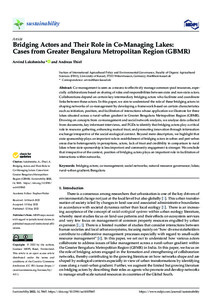| dc.date.accessioned | 2022-06-23T07:49:03Z | |
| dc.date.available | 2022-06-23T07:49:03Z | |
| dc.date.issued | 2022-05-12 | |
| dc.identifier | doi:10.17170/kobra-202206216368 | |
| dc.identifier.uri | http://hdl.handle.net/123456789/13951 | |
| dc.description.sponsorship | Gefördert durch den Publikationsfonds der Universität Kassel | ger |
| dc.language.iso | eng | eng |
| dc.rights | Namensnennung 4.0 International | * |
| dc.rights.uri | http://creativecommons.org/licenses/by/4.0/ | * |
| dc.subject | bridging actors | eng |
| dc.subject | co-management | eng |
| dc.subject | social networks | eng |
| dc.subject | natural resource governance | eng |
| dc.subject | lakes | eng |
| dc.subject | rural–urban gradient | eng |
| dc.subject | Bengaluru | eng |
| dc.subject.ddc | 320 | |
| dc.subject.ddc | 650 | |
| dc.title | Bridging Actors and Their Role in Co-Managing Lakes: Cases from Greater Bengaluru Metropolitan Region (GBMR) | eng |
| dc.type | Aufsatz | |
| dcterms.abstract | Co-management is seen as a means to effectively manage common-pool resources, especially collaborations based on sharing of roles and responsibilities between state and non-state actors. Collaborations depend on certain key intermediary bridging actors who facilitate and coordinate links between these actors. In this paper, we aim to understand the role of these bridging actors in shaping networks of co-management by developing a framework based on certain characteristics such as initiation, position, and facilitation of interactions whose application we illustrate for three lakes situated across a rural–urban gradient in Greater Bengaluru Metropolitan Region (GBMR). Drawing on concepts from co-management and social network analysis, we analyse data collected from documents, key informant interviews, and FGDs to identify that bridging actors play a critical role in resource gathering, enhancing mutual trust, and promoting innovation through information exchange irrespective of the social-ecological context. Beyond mere description, we highlight that state sponsorship plays an important role in establishment of bridging actors in urban and peri-urban areas due to heterogeneity in perceptions, actors, lack of trust and credibility in comparison to rural lakes where state sponsorship is less important and community engagement is stronger. We conclude that irrespective of the context, position of bridging actors plays an important role in facilitation of interactions within networks. | eng |
| dcterms.accessRights | open access | |
| dcterms.creator | Lakshmisha, Arvind | |
| dcterms.creator | Thiel, Andreas | |
| dc.relation.doi | doi:10.3390/su14105865 | |
| dc.subject.swd | Bangalore | ger |
| dc.subject.swd | Akteur | ger |
| dc.subject.swd | Interaktion | ger |
| dc.subject.swd | Management | ger |
| dc.subject.swd | Verantwortung | ger |
| dc.subject.swd | Soziales Netzwerk | ger |
| dc.subject.swd | Natürliche Ressourcen | ger |
| dc.subject.swd | Ressourcenpolitik | ger |
| dc.subject.swd | See | ger |
| dc.type.version | publishedVersion | |
| dcterms.source.identifier | eissn:2071-1050 | |
| dcterms.source.issue | Issue 10 | |
| dcterms.source.journal | Sustainability | eng |
| dcterms.source.volume | Volume 14 | |
| kup.iskup | false | |
| dcterms.source.articlenumber | 5865 | |


